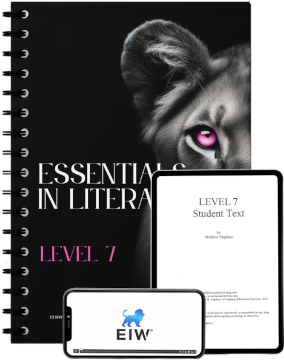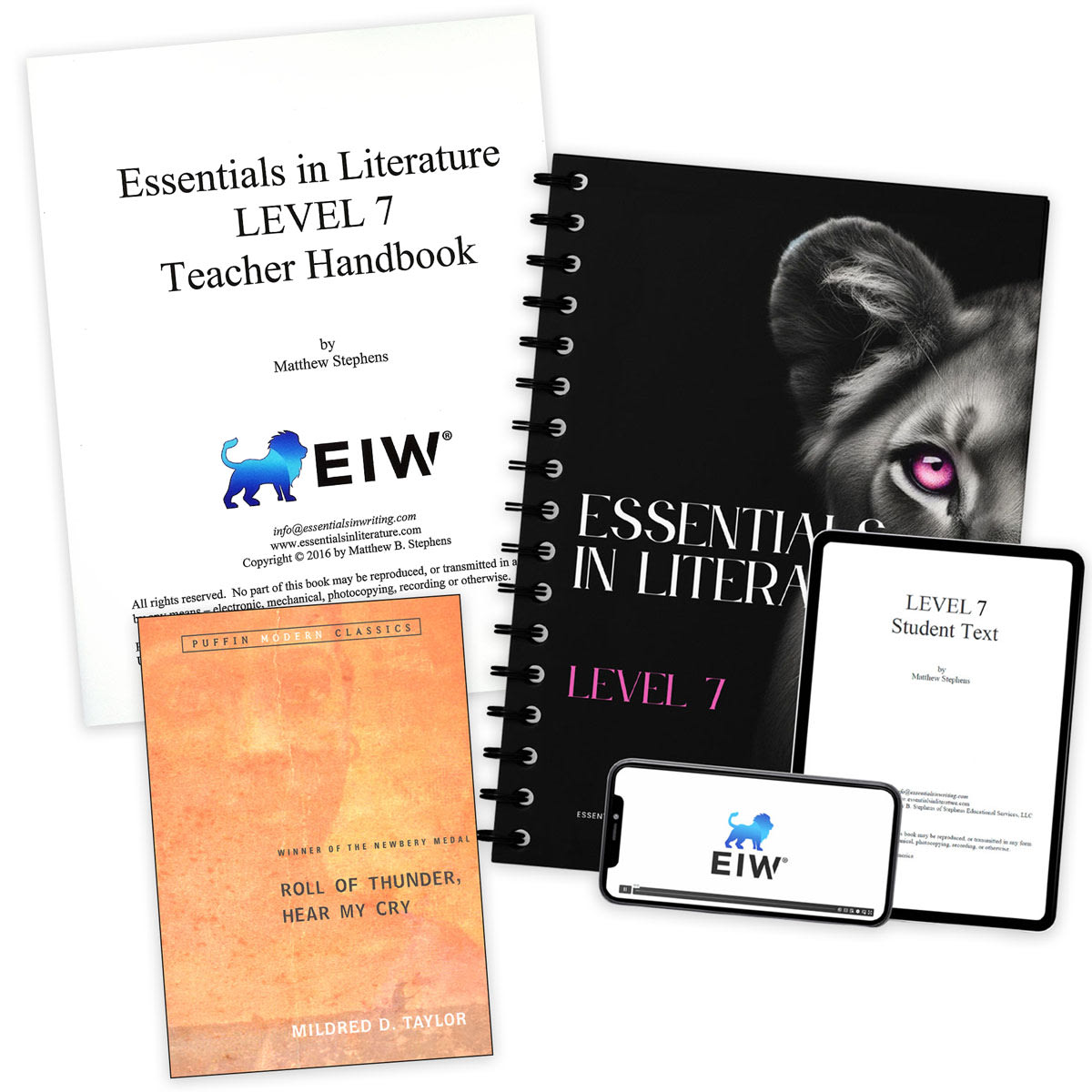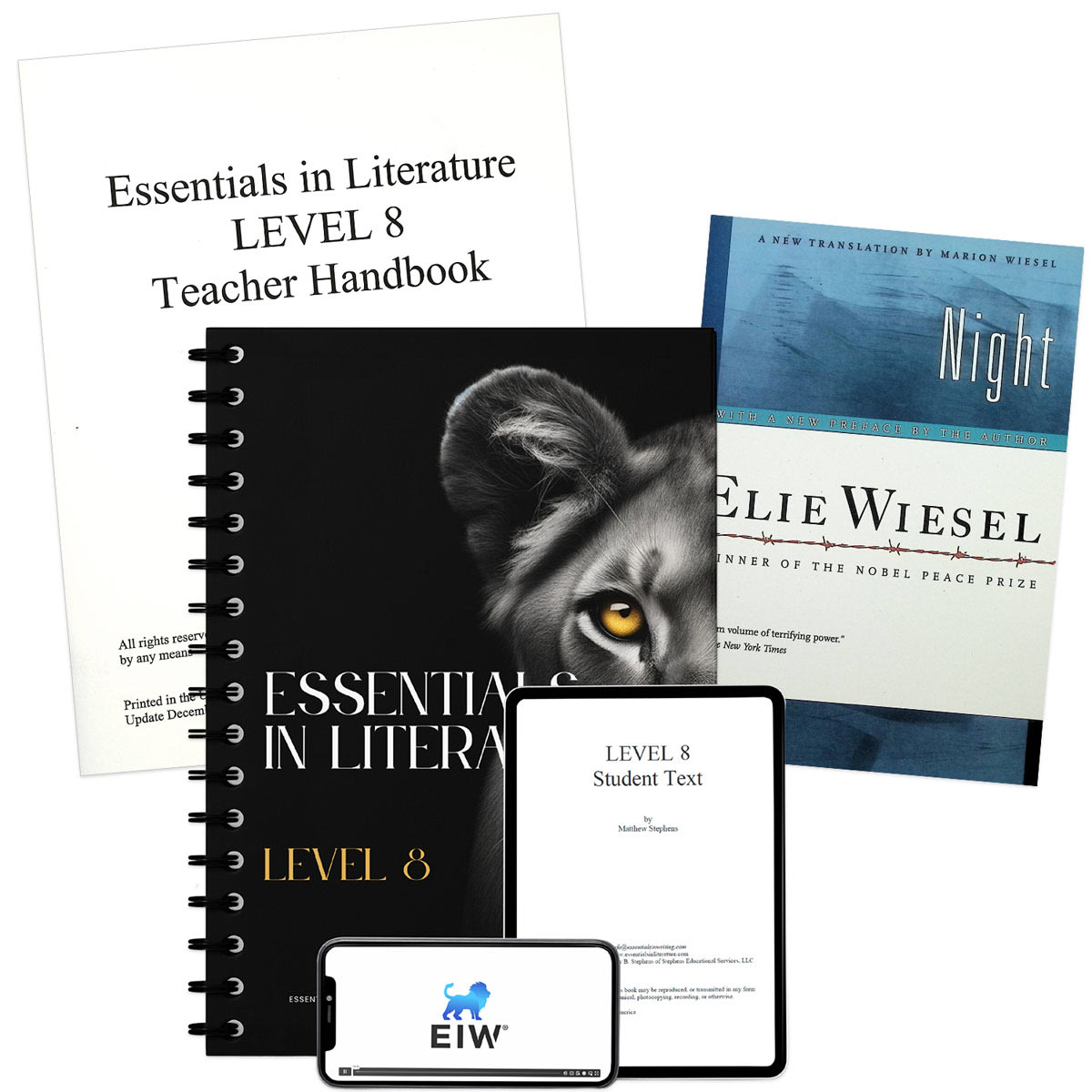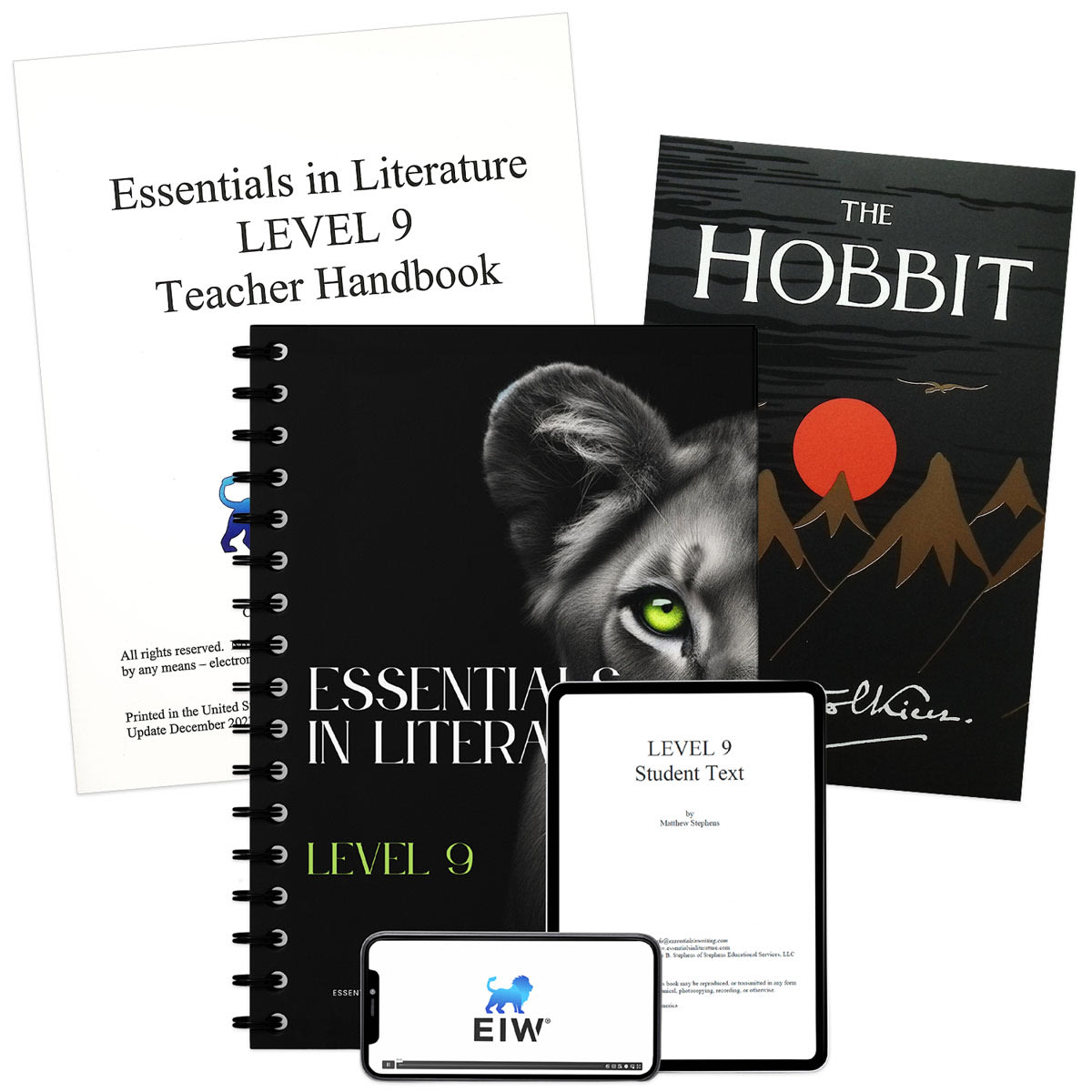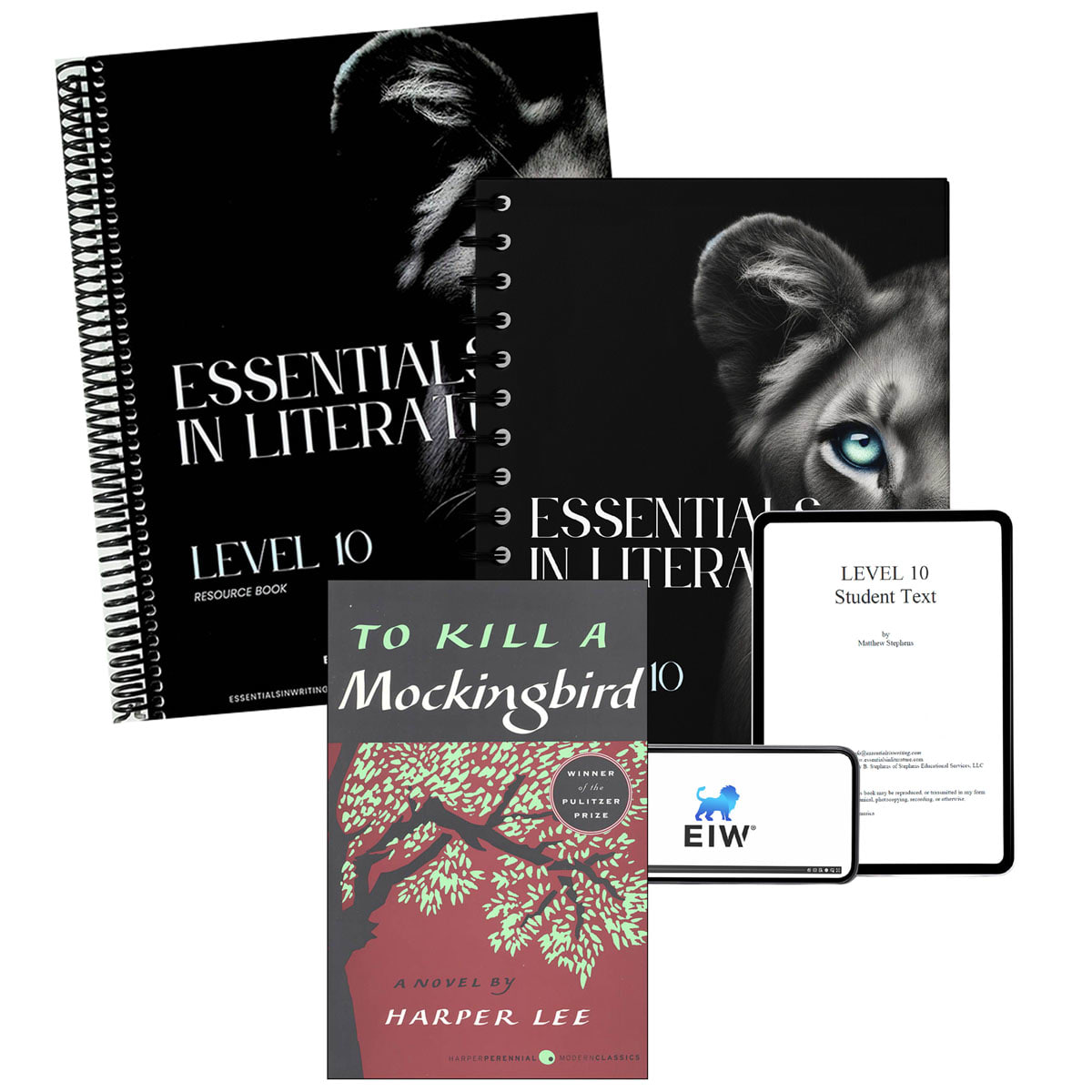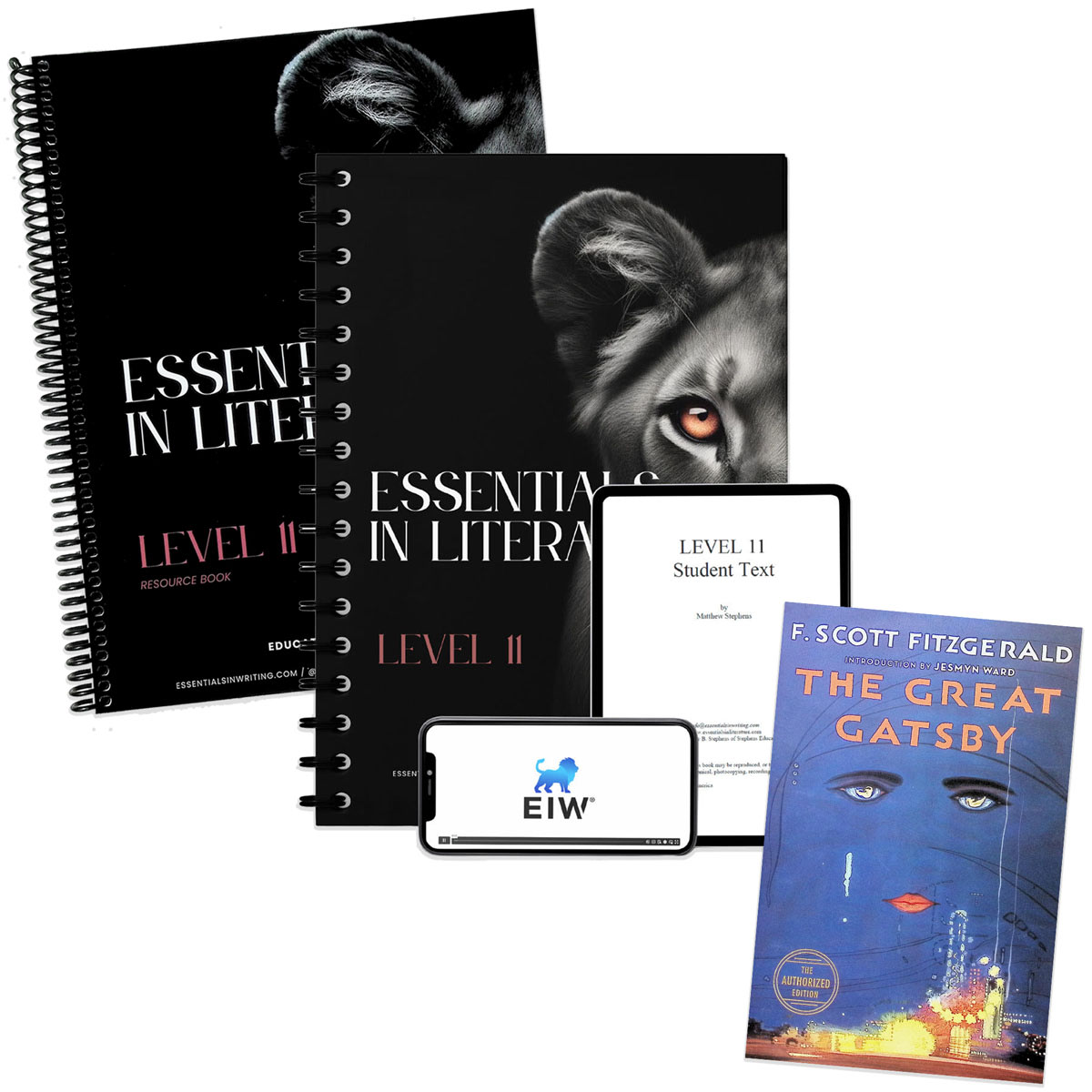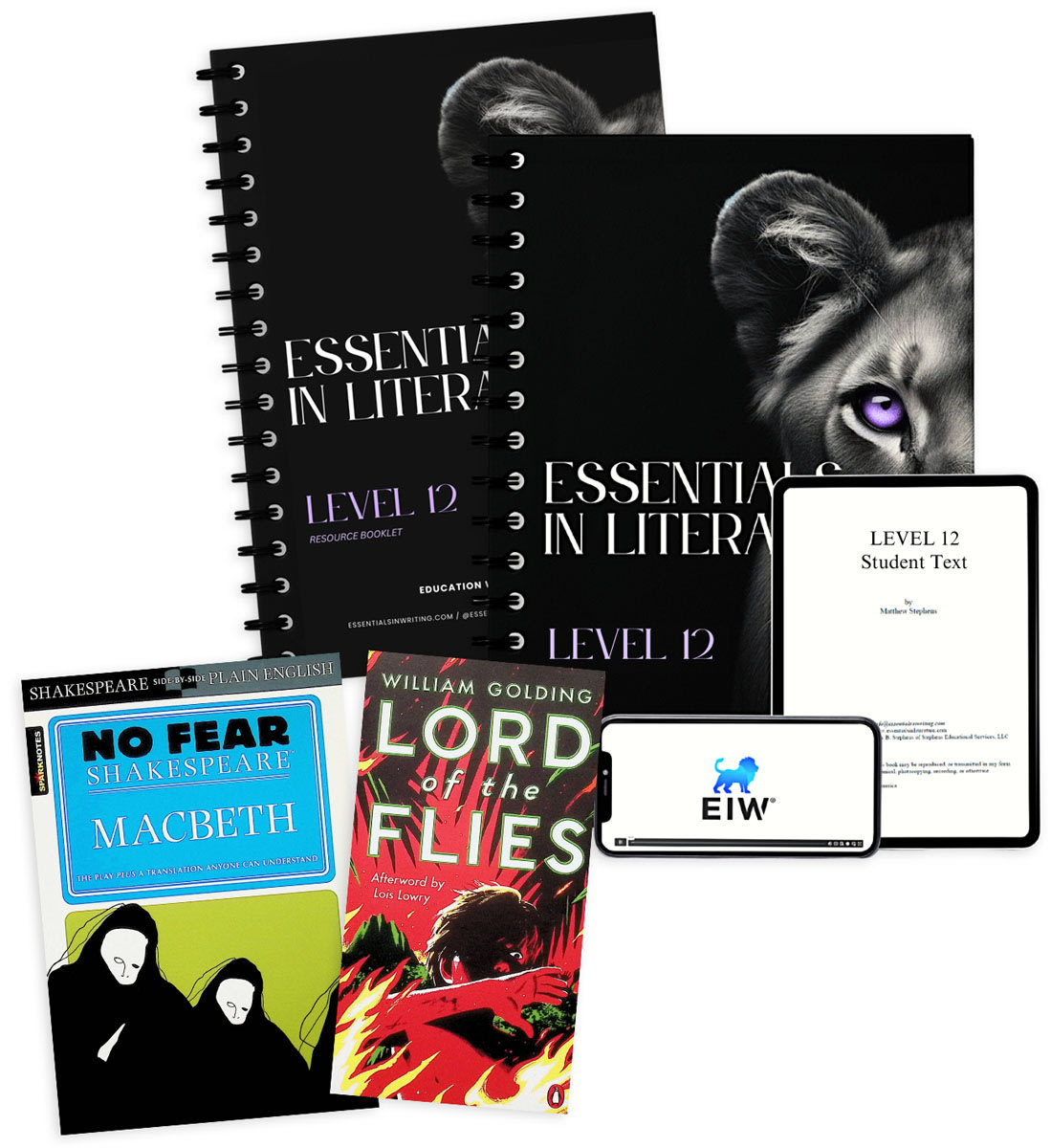Essentials in Literature courses teach literary analysis, vocabulary, and reading comprehension for grades seven through twelve with video instruction presented by Matthew Stephens for all except Level 12, which is taught by Ellie Epperson. Courses for high school do not concentrate on exclusive areas of literature, such as American Literature. However, through the four courses, students are exposed to the equivalent amounts of World, American, and British literature they would study in dedicated courses.
Course sets are available as Digital sets or Digital + Print sets. Digital sets include access to videos (for 12 months) plus digital versions of both student and teacher books. Digital + Print sets include access to videos, printed student and teacher books, and the required novel. DVDs (two or three per course) are available at extra cost. Levels 7 through 9 have a teacher handbook, while Levels 10 through 12 have a resource book.
Levels 10 through 12 have a different layout than Levels 7 through 9. The non-consumable student text is more colorful than those for the other levels. Graphic organizers, activity pages, and assessments are moved to the black-and-white resource books. The student texts tell students when to complete pages in the resource book. The digital versions of the resource books might be easier to use since pages can be printed as needed rather than tearing out the original pages.
How the Courses Work
For most lessons, students read lesson material in the student book as well as the literary work being studied, watch a video lesson, and complete an assignment. Most lessons have short video segments for students to watch in which Stephens teaches about the literary work and clarifies some lesson activities. Icons on lesson pages alert students when they need to watch video segments. After watching the video, students complete assignments in the student book or on pages from the resource booklet for Levels 10 through 12.
Students read one full-length novel for each course along with many shorter literary works that are available free through the Internet. As they study the various literary works, students learn to analyze literature, and they also learn how to make connections between authors, their works, and the historical and cultural settings of the works.
Levels 10 through 12 substitute a unit on drama for the non-fiction unit found in the other courses. However, they add "Nonfiction Connection" assignments for each fictional work studied. For example, students read the short story "Amigo Brothers" in Level 10. Then in the Nonfiction Connection, they research a historic boxing match and answer some leading questions by writing an organized paragraph. This approach provides plenty of interaction with nonfiction as well as fiction.
Each course is presented in four units: fiction, nonfiction (or drama), study of a novel, and poetry or figurative language. To give you an idea of the diversity of the literature used in these courses, these are some of the literary works studied in Level 9: short stories such as “The Secret Life of Walter Mitty,” “The Monkey’s Paw,” and “The Bet,” nonfiction articles such as “Charles Martel Biography,” “Farewell Letter to the Pilgrims,” and “Book Review: A Wrinkle in Time” by NPR Staff; the complete novel The Hobbit; and poems such as “Dreams” and “Red Roses” by Langston Hughes, “Still I Rise” by Maya Angelou, and “Sonnet 29” by Shakespeare. As you can see, the literary works are both old and new.
The novels for Levels 7 through 12 are, respectively, Roll of Thunder, Hear My Cry; Night; The Hobbit; To Kill a Mockingbird; The Great Gatsby; and Lord of the Flies. The Level 12 Digital + Print set adds No Fear Shakespeare's version of Macbeth. Some works, such as Night, are darkly realistic. For that book, Stephens deals with the main character's crisis of faith by having students write a personal letter of encouragement to him. Parents might want to read Night in advance since it is a disturbing book about the Holocaust that would certainly benefit from some discussion rather than just independent reading. In the teacher handbook, Stephens gives parents a heads-up about content that might be considered questionable or offensive and provides them with different ways to address it.
Essentials in Literature courses require less composition work than do many other literary analysis courses. Questions often require only brief answers or a few sentences. However, in Levels 10 through 12, many questions require lengthier answers, and the assessment for each literary work has multiple-choice questions plus two constructed-response questions that require brief essay answers. A few activities in all levels, such as the Connection Reflection questions and the Writing Connection assignments, generally can be answered in paragraphs of only five to eight sentences. Sections, such as Dive Deeper and Think Critically in Levels 10 through 12, stretch students' critical thinking while also requiring either short essay answers or discussion. I think using a mixture of discussion and written responses for these upper-level courses will likely make the amount of writing manageable for students. There are no lengthy essay assignments. (Stephens’ Essentials in Writing courses mesh well with Essentials in Literature since they concentrate on developing and applying composition skills. You can use both courses together for each grade level to fulfill the English requirement.)
Students will generally spend five or six days on each literary work, with additional time allotted for the novel. Lessons for each literary work consist of activities to be completed before the student reads the work, while they are reading the work, and after they read. Students complete some activities directly in their worktext for Levels 7 through 9 and on resource book pages for higher grade levels. Many of these responses are written on graphic organizers that make the process simpler. However, students at all levels will need a separate notebook for writing out lengthier responses or assignments, or they might use a computer.
Vocabulary lists are provided near the beginning of each study. Students are directed through a variety of activities with each group of vocabulary words, activities that are much more interesting than simply looking up definitions. For example, sometimes students are told to write definitions of vocabulary words as they come across them in stories. They are to use context clues to assist them. After reading the story, they compare their definitions with definitions from a dictionary.
The group of lessons for each literary work includes an optional extended activity, which might require brainstorming, research, field trips, interviews, or other activities that extend far beyond literary analysis. It’s up to you to decide whether or not to use them.
Students can work independently through most of the coursework, but they are frequently directed to discuss an assignment with a classmate or teacher. A parent or teacher will also need to correct student work.
The teacher handbook or resource book briefly explains how to use each course. These books also include a list of all literary works to be used, a course syllabus, and an answer key. Assessments are included within the student worktext at the end of each unit for Levels 7 through 9 and in the resource book for Levels 10 through 12. The teacher handbooks and resource books make it very easy for parents to check student work without having to watch the videos and read lesson material themselves. However, discussions might be challenging if parents aren't familiar with the literary works. The answer key sections have suggested answers for many of the questions. Sometimes there are a few sample responses for a single question that might all be correct. Sometimes there are two responses labeled “Quality Response” and “Ineffective Response” to give parents a better idea of the type of response they should expect from a student.
Each course comes with an Alternative Instructional Strategies document that helps parents accommodate students' learning needs. This document (about 20 pages) offers both general suggestions usable throughout a course and other suggestions for individual lessons.
The courses teach literary analysis while trying to avoid promoting any particular value system or point of view. Parents or teachers might choose to add discussion to address values that are presented or implied in some of the literary works.
Free samples are available at the publisher's website.
Summary
Essentials in Literature should be helpful for parents with limited teaching time as well as for students who want to work independently. Most independent study literature courses require students to read extensive instructional material in addition to the literary works. However, the instructional video segments in Essentials in Literature make it easier for students who benefit from visual and auditory input and less reading. While the Essentials in Literature courses still have some instructional material to be read, many students will appreciate the reduced reading load and having a teacher present lessons on videos.





